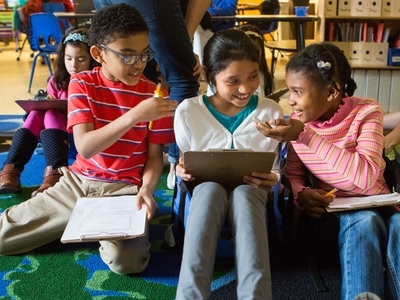Moving Beyond the All-or-Nothing Paradigm for Higher Education
Topics

Today’s learners face a rapidly changing world that demands far different skills than were needed in the past. We also know much more about how student learning actually happens and what supports high-quality learning experiences. Our collective future depends on how well young people prepare for the challenges and opportunities of 21st-century life.
Those with some college but no degree often find themselves in a worse position than before they started.
Historically, degree attainment has been an all-or-nothing proposition. Employer reliance on degrees as a proxy for skills means that higher education offers a pathway to economic mobility, and this is increasingly the case as job titles and sectors that didn't demand a degree just a few years ago now do—a trend known as "upcredentialing." But while learning is incremental, our binary approach to providing recognition of learning means that students see little labor market benefit until they complete their course of study, forcing a false choice between obtaining a degree or a sub-baccalaureate certificate.
Unfortunately, this all-or-nothing approach to higher education means that those with some college but no degree often find themselves in a worse position economically than before they started, despite the accumulation of new skills, knowledge, and experience. It is a particularly problematic dynamic at a time when our student population is shifting: Today's post-traditional student is older, more likely to be studying part time, and more likely to have obligations such as work or family in addition to academic pursuits.
The shrinking shelf life of skills and the dynamic demands of our modern economy mean that today's learners are eager to embrace the concept of lifelong learning. They're creating opportunities for savvy institutions to extend the relationship with students over many years, fostering the shift to a "renewable" paradigm for learning, where the durability of skills—and credentials—matters less. This is particularly important for today's post-traditional students (who represent the new normal), who are less likely to simultaneously have both the years of time and the money required for degree attainment.
But what if there were a way for these "new normal" students to reap some of the financial benefits of their course of study before obtaining their diploma? What if they could access their educational equity to support further progress down their academic path? And what if they had a way to demonstrate their new skills in nearly real time, in a way that was discoverable to employers?
A growing number of institutions are providing students with the opportunity to earn and share evidence of what they know as they progress along a higher education path. This gives students something to fall back on if they don't end up graduating, and it also allows them to access the benefits of their education in a way that lowers the opportunity cost of significant investments of time and money. It is an approach enabled by the shift among forward-thinking employers to look beyond degrees as a proxy for skills. And savvy students are seeing the value in marketing their verified skills apart from a degree.
For example, an architecture firm in Colorado was struggling to find workers to fill technical roles. Several positions had gone unfilled for six months or more. After connecting with an administrator at the Colorado Community College System (CCCS), the firm realized that a digital badge offered by CCCS effectively demonstrated that the students had obtained the skills needed to succeed in the current job vacancies. Within 72 hours of reaching out to students who had earned the badge, the company had filled all of its open positions. (To learn more about the lessons learned from this program, check out Partnering with Employers to Create Workforce-Relevant Credentials: A Field Guide.)
But the company was not the only winner in this story. The students hired to do this work were able to use their new skills much more quickly than if they had to wait to complete their program. By finding work in a relevant position, the students also had more opportunities to apply and hone the skills they were learning in the classroom.
They likely also saw increases in their earning potential as a result of their new skills. In one study of community colleges in California, students studying water and wastewater technology increased their quarterly earnings by 30% after earning just 12 credits.
As an added benefit, finding more remunerative work may even help students pay for college during their degree programs. Studies show that relatively small debts can lead to students' dropping out of an institution without completing (leading some schools to launch emergency loan programs); as a result, even small increases in pay might help students overcome unexpected expenses and persist toward completing their degree.
Digital credentials enable students to promote their competencies in a data-rich, verifiable way. By offering these tools, colleges and universities can shift the paradigm, moving away from the current all-or-nothing approach while providing real-time access to new skills that create tangible economic opportunities for their students.




